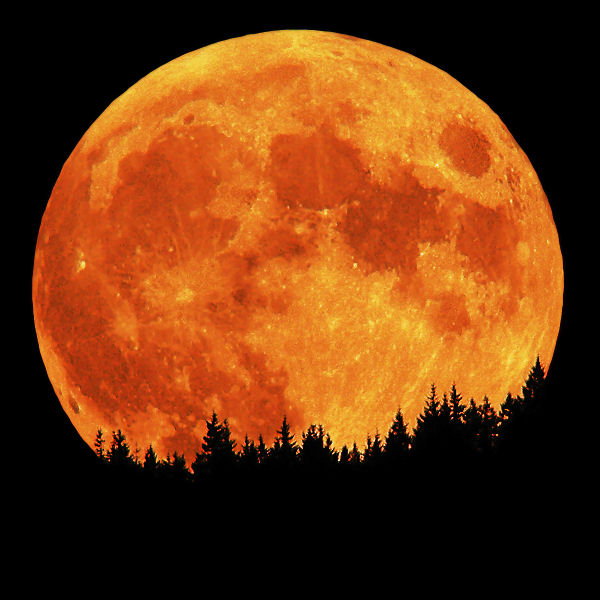For centuries, people have held onto this theory that the full moon makes people nutty. The word lunacy or lunatic is actually derived from the Latin luna, which means "moon." But is there any actual truth to the theory that people go even slightly crazy during the full moon?

Does this sight make you feel a little wacky?
(Photo by David Heath, who provides details about how he took this picture)
The short answer is no.
Scientists have studied the correlation between the presence of a full moon and upticks in emergency room visits, spikes in aberrant psychiatric behavior, possible increases in drug abuse, etc. The majority of the studies conducted can find no correlation between the full moon and people's behavior. Some studies do show an increase in some activity or other, but sometimes that increase occurs during a different phase, like the new moon or the waxing moon, rather than the full moon And some of those studies suffer from serious flaws in how they were designed or carried out.
Despite the preponderance of evidence weighing against the theory, many people do still believe that there is a correlation. They often present their own "evidence," which is often anecdotal, or the story of what happened to one guy on one night that happened to be a full moon.
Some police departments do staff more officers on the full moon -- not because the moon makes people crazy, but rather because the extra light keeps people out and about longer, so they seem to be more likely to get into car accidents or otherwise have things happen to them. It is worth noting, however, that many research studies did not show an increase in the number of car accidents during any particular phase of the moon.

If people do get wonky during the full moon, how come the wonkiness doesn't seem to start when the full moon is visible during the daytime, but waits until nightfall?
(Photo by cinnamon gurl, posted at her blog Write About Here)
Even so, people have an ongoing fascination with the moon, and some hold on to the theory that the full moon makes people nutty. Well, all right, if you really want to go on believing that, I guess that's fine. But to those of you who persist in this belief, allow me to pose these questions: why should the moon's fullness (which is really a play of light based on the positions of the Earth and the moon relative to the sun) have an effect on the behavior of some individuals? And if it does affect the behavior of some people, why doesn't it affect everybody, and in the same way?
Selection of Studies that Found the Full Moon Does Not Influence Human Behavior
- One 1983 study found that while calls to a poison center about unintentional poisonings increased during the full moon, calls about intentional poisonings showed no correlation.
- Furthermore, that study found that drug abuse and suicide attempts increased -- not during the full moon but during the new moon.
- A study in 1994 found no correlation between the presence of a full moon and admissions to a psychiatric hospital.

Is it the full moon, or is it Beatlemania?
(Photo by Birinci Bölum)
- A 1983 study of calls for police assistance over a three-year period found no relationship between the number of calls and the phases of the moon.
- Multiple studies investigating the relationship between the phases of the moon and the occurrence of suicide have been conducted. Many have found no relationship, including an extensive study of 4,190 suicides over a 58 year-period.
- A study of nearly 151,000 emergency-room admissions over a four-year period found no increase in patient visits to the hospital, the number of calls for ambulances, or admissions to hospitals on the day of a full moon.

You may want to be less aggressive toward animals during the full moon, although this particular dog looks too happy to bite anybody.
(Photo from Dog Chat)
- One study did show that the number of people reporting being bitten by animals increased during the full moon. However, two other similar studies showed no such relationship.
For a longer and more comprehensive list of these and other studies, see Dr. Chudler's list of studies on whether the full moon influences behavior.
And finally, I'll ask you: did you feel a little extra psycho today? Did you notice any inexplicable oddities in your behavior at all? Did you even know that tonight was a full moon?

We'll probably understand the connections between the full moon and human behavior only when we get our hands on a few of those werewolves out there. Like this one!
(You can print out this picture and color it yourself for free)
Sources
Hannah Holmes, The Skinny On Lunacy and the Full Moon, Discovery Online
Eric Chudler, Ph.D., University of Washington, Moonstruck! Does the Full Moon Influence Behavior?
Robert Todd Carroll, The Skeptic's Dictionary, full moon and lunar effects
Astronomical Society of the Pacific, Astronomical Psuedo-Science: A Skeptic's Resource List, 5. The Full Moon and Lunacy
Benjamin Radford, "Strange Things Do Happen at Full Moon," Live Science, June 13, 2007
I believe that one important study has not been done....a study to show the correlation between mean customers at the Gap and a full moon. This would prove it!!!!!!!!!!
ReplyDelete;)
Jarred
U've missed something else here...the Moon has a big influence on the tides and knowing that people's body is made out of a large percentage of water (women more then men) there is a reason to believe that people feel differently during the different cycles of the Moon.
ReplyDeleteThat doesn't necessarely mean that they'll go bumping their heads against the wall :)
Personally, I can do with only few hours sleep and my energy levels soar during the full Moon, and for the rest of the phases I feel fine and do need to sleep more.
Danny
Thanks for pointing out my omission, Danny.
ReplyDeleteQuoting from one of my sources, "The lunar force is actually a very weak tidal force. A mother holding her child 'will exert 12 million times as much tidal force on her child as the moon' (Kelly et al., 1996: 25)." Furthermore, "It is claimed by many that the earth and the human body both are 80% water. This is false. Eighty percent of the SURFACE of the earth is water. Furthermore, the moon only affects unbounded bodies of water, while the water in the human body is bounded. Also, the tidal force of the moon on the earth depends on its distance from earth, not its phase."
I also feel obliged to point out that when considering the relative size and force of the moon compared to a human body, the gender of that human is irrelevant.
Please see http://skepdic.com/fullmoon.html for more discussion.